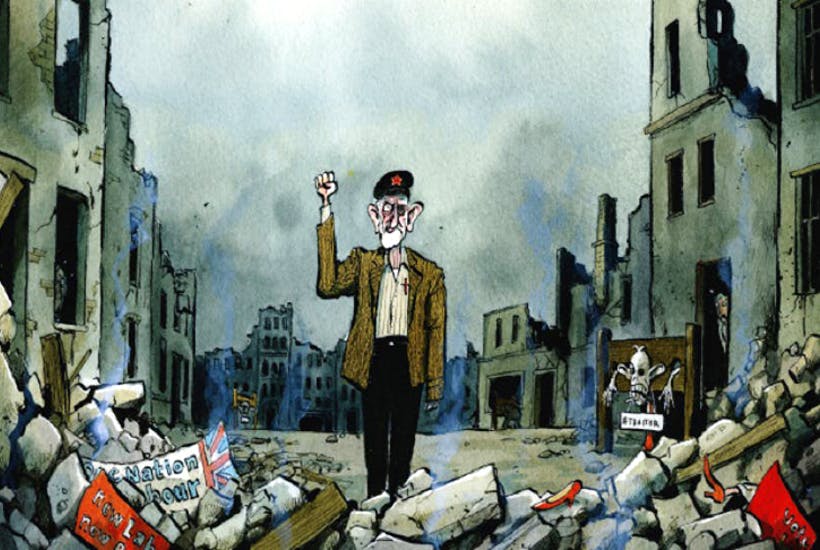The morning of 13 December. A series of salacious revelations about his private life have sunk Boris Johnson’s campaign. A re-energised Nigel Farage has led a Brexit party surge in the north, splitting the Leave vote. The ousting of Jo Swinson in a coup organised by refugees from the People’s Vote campaign led to Remainers flocking back to Labour. The SNP has swept Scotland. Plaid Cymru and the Greens have picked up a dozen seats where they co-operated. And a couple of Tory rebels have managed to hang on as independents. After the dust settled on the most chaotic election campaign in memory, Jeremy Corbyn had just enough votes to lead a Labour/SNP/Green/Plaid/Independent coalition.
The first 100 days of the Corbyn government were to prove a challenge, however. As the new prime minister took office, the markets dramatically lost confidence in sterling and the FTSE. A radical manifesto that promised a sweeping extension of state control, nationalisation, and a massive increase in government spending terrified investors. After heavy selling on Friday, when the markets opened again in the Far East on Sunday night the pound had already sunk below parity with both the dollar and the euro.
By Monday, the FTSE lost another 1,000 points after the battering it took on the Friday. When Mark Carney pushed through an emergency rise in interest rates to protect the pound, he was dramatically fired by the chancellor John McDonnell, and the Bank of England was bought under Treasury control.
On the Tuesday morning, capital controls were introduced to stop any more money fleeing the country. By the evening, half the flights out of Heathrow had been cancelled because of the backlog of checks on anyone taking more than £200 out of the country.
Over the rest of the month, prime minister Corbyn tried to push through his radical agenda. Student fees were abolished and old debts were written off with money created by the Bank of England. The water, rail and energy industries were taken into state ownership and investors paid only in newly-created ‘Green People’s Bonds’ which were immediately marked down to zero when anyone tried to trade them in the City.
Massive increases in public sector pay were pushed through but that didn’t stop Unite calling a series of strikes to ask for more. As the political world gathered again in January, the crisis only deepened. The EU declared that state aid rules had been broken and started legal action against the British government. Foreign secretary Diane Abbott tried to re-open negotiations on a new Withdrawal Agreement, but the prime minister’s declaration that he would campaign for Leave in a subsequent referendum meant the EU refused to talk any more.
At a crisis summit on 30 January, Angela Merkel and Emmanuel Macron agreed Britain would have to leave the EU the next day without a deal. Tariffs and border checks were imposed overnight. It got worse on the first day of February when president Trump announced tariffs of 50 per cent on all British goods in retaliation for Corbyn’s tax raid on Amazon. Trump completely banned the sale of Scotch whisky saying everyone should drink bourbon instead.
Corbyn’s government limped through the first two weeks of a bitterly cold February. Food shortages were becoming widespread and with foreign currency drying up, there were few flights out of the country because the airlines couldn’t pay for jet fuel. When Nicola Sturgeon withdrew her backing for the government and declared unilateral independence for Scotland with the support of the EU, which immediately welcomed the new country back into the club, the government finally collapsed.
The final surprise was the appointment of Lord Osborne, ennobled in Johnson’s resignation honours list, as the caretaker PM by the Queen while fresh elections could be organised. But by that stage he was the only person who could get the emergency IMF loan that was needed to keep the country afloat.






Comments